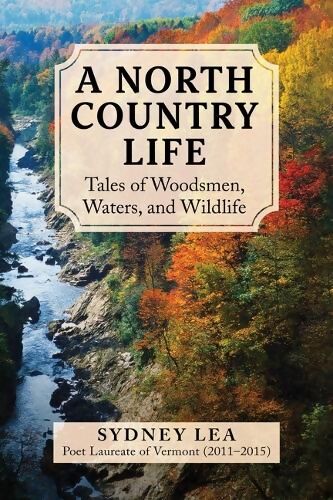- Anasayfa
- Kurgu Dışı
- Hobi
- Hayvan
- North Country Life
North Country Life
Tales of Woodsmen, Waters, and Wildlife
Yazar :
Sydney Lea
Önsöz :
Nick Lyons
Yayınevleri:
Skyhorse Publishing
Kitap Formatı:
Ciltli/Kutulu Kitap
Bu Üründe Kargo Bedava!

Kitaplar ekstra gümrük ve kargo masrafı olmaksızın ortalama 28 gün içerisinde yurt dışından sizin için temin edilip adresinize teslim edilmektedir.
"There is a soulful quality to his words and a strong conviction that a connected life is one to be admired and emulated. A cross between Thoreau and David James Duncan, Lea is a northern treasure." —Booklist
A North Country Life is the story of author Sydney Lea’s powerful connection to his family, friends, and the northern outdoors. Loosely organized by the changing of seasons, different sections feature essays on such topics as childhood family fishing trips in the wilds of Maine, trophy fly-fishing the northern reaches of the Connecticut River, the opening day of turkey hunting season in Vermont, and getting lost in the deep woods while deer hunting. The essays are introspective and dramatic illustrations of the blending of the human and natural worlds; emotion is attached to both spheres and adds texture to the sketches. Readers of varied interests will be drawn to the sincerity of the author’s voice.
A notable writer and poet, Lea’s lyrical writing preserves a picture of people and places from the past with vivid scenes recalling former times and contrasting them with modern life. Thoughtful portraits of New England elders and the author’s friends bring to life the outdoors as seen through many different eyes, inspiring readers to take a new look at the world around them. With the author’s knack for descriptive language, this compelling read will strike a chord with anyone interested in the contemplative side of nature—which, in truth, is most of us.
Değerlendirmeler
“Sydney Lea is a fisherman, a hunter, a philosopher, a trainer of bird dogs, an interpreter of the past and a collector of stories. This abundance of experience shows up to good effect. Mr. Lea . . . draws upon his own experiences to give texture to storytelling. He writes memorably. His stories ring true.” —Christopher Kimball, The Wall Street Journal“Lea, Vermont’s poet laureate, has crafted a series of essays on the people and places of his rural northern environment that will appeal deeply to those who love or admire New England and can appreciate the quiet life . . . The author’s literary expertise shines through in a passage where bass fishing reminds him of an Elizabeth Bishop poem but as much as his essays are about quail and dogs and logging, Lea reaches beyond regionality to a purely American experience. There is a soulful quality to his words and a strong conviction that a connected life is one to be admired and emulated. A cross between Thoreau and David James Duncan, Lea is a northern treasure."
— Colleen Mondor, Booklist
"Vermont poet laureate Lea (A Hundred Himalayas: Essays on Life and Literature, 2012, etc.) meditates on the role of people and place in his life and pays tribute to the many woodsmen (and women) who were his guides and mentors.
'I’ve always been intrigued by the blending of natural and human worlds—or rather by the dramatic illustration of that blending,' writes the author in this account of a number of the salty characters, many now deceased, who played a part in his life, many of whom he has described in previously published essays. Here, their stories help him chronicle his life and share his deep love for the northern New England woodlands and his passion for hunting and fishing. He describes with gusto his epic combats as a fly fisherman when he was a “hyper-hormonal young man,” and he is unapologetic about his love of hunting, which he describes as a 'life-long passion.' Lea disparages what he describes as 'the rants of People for the Ethical Treatment of Animals,' who don't understand the “sacramental” value of hunting, and he expresses great regard for the woodsmen who mentored him and accompanied him on his adventures. However, he is cleareyed in his appraisal of how much poverty and alcohol abuse were also a part of that bygone way of life. While he himself no longer traps animals, he pays tribute to the trappers who 'know things about the ways of nature that our Staples-and-Domino's culture is largely unaware of.' Lea is involved in an effort to create a 1 million-acre wildlife preserve on the border between Maine and New Brunswick that will be managed according to green guidelines.
While his uncompromising views are—and are intended to be—provocative, the author’s love of nature and his tender evocation of a way of life that is dying out has appeal." —Kirkus Reviews
| Kitap Adı | North Country Life |
| Yazar | Sydney Lea |
| Önsöz | Nick Lyons |
| Yayınevleri | Skyhorse Publishing |
| Metin dili | İngilizce |
| Barkod | 9781510780071 |
| Ürün Formu | Ciltli/Kutulu Kitap |
| Yükseklik | 229 mm |
| Genişlik | 152 mm |
| Kalınlık | 23 mm |
| Birim ağırlığı | 386 gr |

